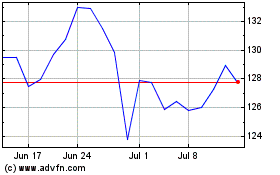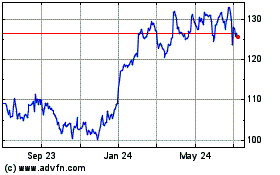Obama Administration Makes Last-Ditch Push for Trade Vote
September 13 2016 - 10:30PM
Dow Jones News
The Obama administration is enlisting business leaders in a
last-ditch effort to win Republican support for its signature
Pacific trade agreement after the election.
A business-led advisory committee known as the President's
Export Council is expected Wednesday to call on Congress to pass
the Trans-Pacific Partnership agreement in the "lame duck" session
at the end of the year.
"We're calling for the passage of the TPP by the end of this
year," said Ursula Burns, chief executive of Xerox Corp. and chair
of the export council. "If we continue to try to search for this
'perfect deal,' we'll get nothing done."
Getting a majority of the House and Senate to back the 12-nation
deal remains a high hurdle. GOP presidential nominee Donald Trump
has made opposition to trade pacts a centerpiece of his campaign,
and Democrat Hillary Clinton has moved toward firm opposition to
the TPP, although she championed the TPP talks while secretary of
state.
The opposition in the presidential race makes it almost
impossible Congress will vote on the TPP before the election, but
President Barack Obama and other officials eyeing the pact as a
legacy are promoting the possibility of a 2016 vote after the
election.
"A new administration comes in—it doesn't matter which one—trade
is not going to be an immediate priority for the next couple of
years," said United Parcel Service Inc. Chief Executive David
Abney, a member of the council.
One of the administration's goals is to unify the business world
as much as possible. Technology associations sent a letter Tuesday
to congressional leaders backing passage of the TPP this year. But
Detroit auto makers have withheld support for the deal, which would
lower tariffs on Japanese rivals, while drugmakers are seeking
assurances their intellectual property rights will be protected and
future trade pacts for as long as possible.
Largely due to pharmaceutical industry concerns, business groups
and key congressional Republicans were cool to the TPP when
negotiations concluded in October.
Merck & Co. Chief Executive Kenneth Frazier, another member
of Mr. Obama's export council, hasn't endorsed the TPP, and a
spokeswoman for the company said that "it's crucial for the
administration to work with Congress to effectively address the
congressional concerns," including intellectual property protection
for biologic drugs.
Since negotiations were concluded, Mr. Trump and Sen. Bernie
Sanders, Mrs. Clinton's rival in the Democratic primary race, made
opposition to the trade pact a key campaign message, complicating
the choice for House and Senate lawmakers facing re-election bids
this year.
Administration officials are using the negative trade politics
to rally companies that support the deal—and those firms' GOP
allies in Congress—to line up behind the TPP after the election,
since the next president is unlikely to touch the pact in its
current form.
"The president wants this done," said John Engler, the former
Michigan Republican governor who is president of the Business
Roundtable, a group comprising chief executives of leading U.S.
firms. "He's got members of his party that he's talking to. We're
talking to Democrats and Republicans about the importance of this,"
he told reporters Monday.
The Obama administration has at times had a difficult
relationship with quite a few leading American firms, and some
Republicans are following Mr. Trump's lead in distancing the party
from big business groups. Small businesses, many of which could
benefit from the TPP, are harder to reach and organize.
House Speaker Paul Ryan (R., Wis.) and Senate Majority Leader
Mitch McConnell (R., Ky.), hoping to keep GOP control of both
chambers, have played down the outlook for a vote after the
election, and people following the issue say the political
environment for trade would have to improve quickly after the
election to allow a vote.
"We're simply not there yet," said Sen. Orrin Hatch (R., Utah),
Chairman of the Senate Finance Committee, which oversees trade.
"Should the administration fully engage with members and actively
work to address the substantive concerns that have been expressed,
we'd have a real opportunity to advance a strong TPP that meets the
high standards" that Congress set in trade legislation that
narrowly passed last year.
The 2015 legislation, known as "fast track," allows for trade
agreements to pass with a simple majority vote, with no amendments
or procedural delays.
Meanwhile, the Obama administration's latest efforts haven't
passed unnoticed among labor unions, environmental groups and other
opponents.
"While the president is cloistered with corporate chieftains
planning how to use a lame duck session to try to pass a TPP only
they love, Congress' phones are ringing off the hook with anti-TPP
calls," said Lori Wallach, senior trade expert at Public Citizen, a
government watchdog organization.
Write to William Mauldin at william.mauldin@wsj.com
(END) Dow Jones Newswires
September 13, 2016 22:15 ET (02:15 GMT)
Copyright (c) 2016 Dow Jones & Company, Inc.
Merck (NYSE:MRK)
Historical Stock Chart
From Mar 2024 to Apr 2024

Merck (NYSE:MRK)
Historical Stock Chart
From Apr 2023 to Apr 2024
